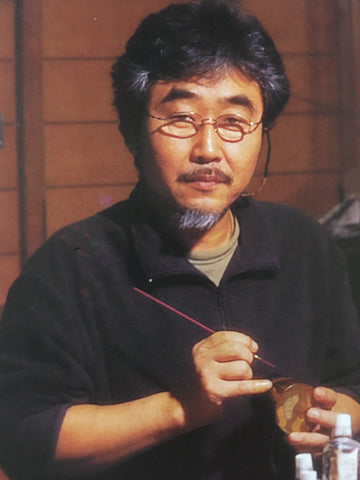Danitrio Green Pheasant Maki-E on Sho-Genkai Fountain Pen
Starting at $1200/mo for 6 month no-interest installments, 10% down using 
Learn about our Payment Relief Plan. |
|---|
✓ 100% Genuine Urushi
✓ Contains the Maki-E Red Seal (Highest Quality of Maki-E Art)
✓ Hand-painted by highly-trained Japanese Artisans
Crafted with the utmost precision, this pen showcases the splendor of the Japanese green pheasant in resplendent gold maki-e and vibrant urushi lacquer. Against a backdrop of deep satin black, their brilliance is elevated to new heights, while every feather and fold is meticulously rendered. The result is a work of art that captures the essence of the pheasant with unrivaled detail. The green pheasant, Japan's national bird and a native inhabitant of the Japanese archipelago, holds a profound cultural significance. In the Shinto religion, it is closely associated with Amaterasu, the ancient sun goddess. Legends in Japan tell us that the green pheasant serves as Amaterasu's trusted messenger, connecting this pen to a rich tapestry of mythology and tradition.
About Danitrio Sho-Genkai Series:
The Sho-Genkai was derived out of the Genkai series. Danitrio wanted to create a shorter version of the Genkai. Genkai means "Limit" in Japanese.
Nib Details:

This pen is furnished with an 18k Gold, two-toned #8 nib.
An UrushiPen.com representative will contact you to confirm nib tip size preference (fine, medium, broad, or stub) following the placement of the order.
Technical Specification:
| Cap Length | 65 mm (2.56") |
| Cap Diameter | 19 mm (0.75") |
| Barrel Length | 115 mm (4.53") |
| Barrel Diameter | 17 mm (0.67") |
| Pen Length (Closed) | 155 mm (6.10") |
| Pen Length (Posted) | Cap does not post |
| Net Weight | 42.5 g (1.25 oz) |
| Net Weight (w/ink full) | 53 g (1.3 oz) |
| Filling System | Eye Dropper |
About the Artisan:

This pen was hand-painted by Masayuki Hariya (Yuhaku). Born in 1954. Yuhaku is a regular participant of the in art exhibitions in Japan and has been awarded the "Dento-Kogei-shi" title, which an honorary title meaning "master of traditional crafts" and is given only to a select few artisans who have a significant contribution to their craft. He believes Maki-E is a craft and an art. He performs Maki-E primarily on Natsume (tea containers), jewlry, and fine writing instruments. His wife is also a Maki-E artisan that focuses on tea containers and jewelry.




